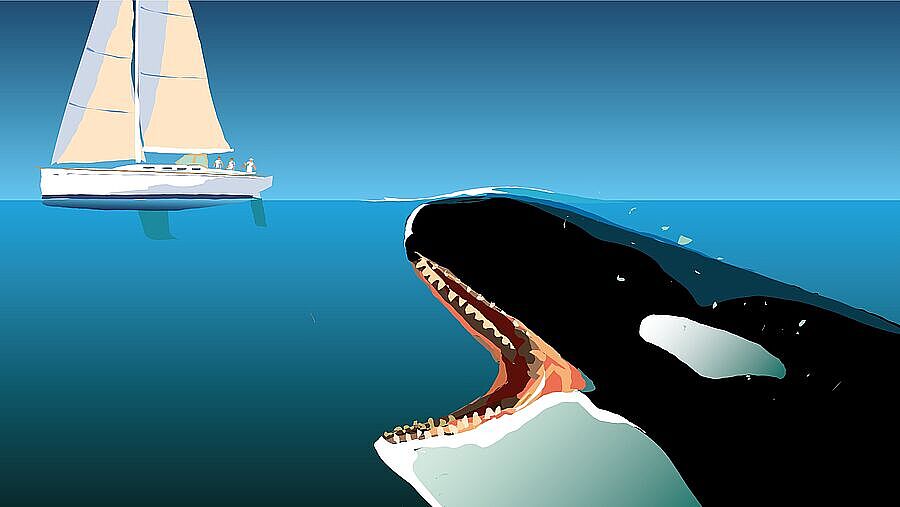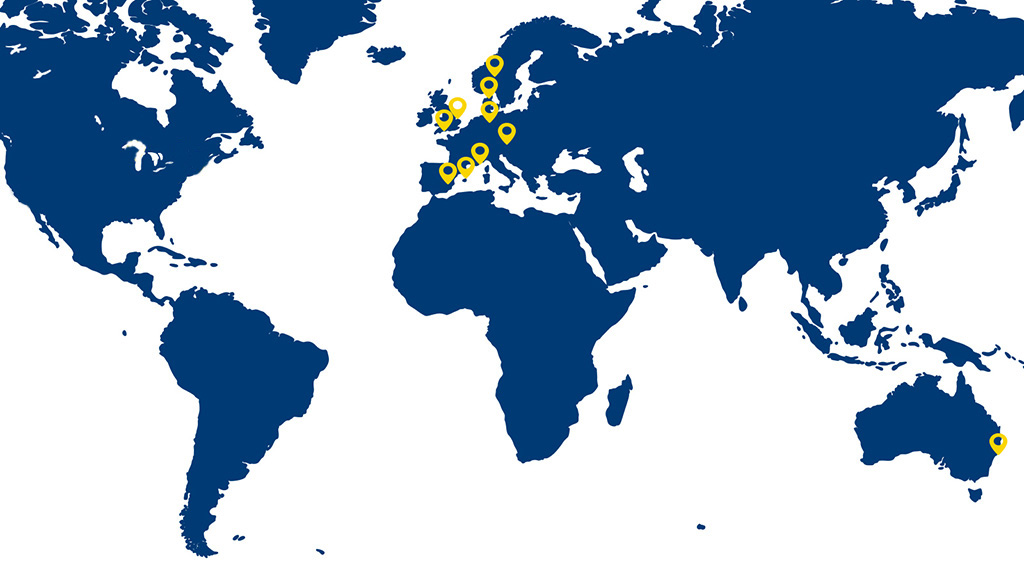How to react when Orcas approach a Sailboat
Reports of orcas biting rudder blades and causing sailboats to sink are becoming more and more frequent. But how great is the risk really? And what can you do if there is an encounter between orcas and a sailboat?

Seven Tips if you encounter Orcas
- Switch off the autopilot
- Let go of the steering wheel or tiller
- Stop, switch off engine and depths finder, furl sails
- Notify the authorities (Channel 16)
- Reduce movement on deck
- Hold on tight
- Take photos and videos
Orcas go for Sailboat Rudder Blades
It was a perfect sailing day in the summer of 2021 when transfer skipper Pete Green was sailing off the southwest coast of Spain. Green and his crew were taking an Amel 52 from Gibraltar to the UK. Everything was going smoothly until suddenly the yacht's steering wheel started spinning back and forth uncontrollably.
"We knew about the risk of encountering orcas, so we stayed close to the Spanish coast, but we didn't see them coming," says Green, managing director of Halcyon Yachts. "The wheel suddenly turned from left to right as they collided with the rudder."
Stay passive when Orcas approach
The crew immediately switched off all electronics, stopped the engine, furled the sails and lay down on deck. They followed all the advice they had seen to wait passively in the water until the whales get bored. The orcas circled the Amel for almost two hours, at times so close that the crew was able to take photos and videos of the animals. All the while, the marine mammals bumped against the hull, keel and rudder blade.
"It seemed like an eternity before they finally let go of us," recounts Pete Green. By the time the orcas disappeared, the rudder was already badly damaged. "In some ways it was amazing to be so close to these magnificent, huge and elegant creatures. But it was also scary to know that they could cause serious damage. If the rudder had been destroyed, we would have lost control of the ship. Fortunately, we still had a tiny bit of the rudder blade left, just enough to hold course and take shelter."
Orca Interactions with Sailboats remain rare
In recent years, there have been a number of incidents involving killer orcas off the Atlantic coasts of Spain and Portugal. Most of these incidents have taken place between the Strait of Gibraltar and the Gulf of Cádiz. Orca populations spend the summer in this passage to feed on fish such as bluefin tuna and to nurse their calves.
News of alleged "attacks" has spread rapidly in recent times. This may give the impression that the oceans are full of aggressive mammals, when in fact the opposite is true. These "attacks" appear to be the acts of a very small number of animals who seem to have developed this behaviour under special circumstances.
Only a small Number of Animals
Marine biologist Monica Gonzales works for CEMMA, a Galician NGO that runs the website orgaiberica.org. CEMMA collects data on sightings of and interactions with orcas. In an interview with the sailing blog No Frills Sailing in May 2023, Gonzales said that, based on the data collected so far, she estimates that one in every hundred sailboats in the region is touched by orcas. About a fifth of these sailboats are damaged so severely by the encounters that they are left unable to manoeuvre.
Gonzales says 15 animals that have been involved so far. Most of them are juveniles, only a few are adults. They apparently belong to different families and are distributed in three to six pods.
The Reasons are still unclear
To explain the orcas’ behaviour, Gonzales is pursuing two hypotheses, neither of which has anything to do with "attacks": It could be a newly invented behaviour, or it could be a reaction to a bad experience with a sailboat.
Dr Ruth Esteban, a marine mammal researcher based in Cádiz, has also been monitoring the Spanish orca population for years. She goes with the theory that the young animals are playing. Possibly, they find the rudders particularly tempting as these can move and be pushed.
German Sailor and author Thomas Käsbohrer mentions in an interview with Segelreporter.com other hypotheses he has compiled: disease, revenge, hunger, hunting. "Some see the attacks on rudders as a signal to 'get lost and get out of our territory!'" So far, however, none of these hypotheses can be considered conclusive.
Avoid Encounters with Orcas
In order to avoid encounters with orcas, the Spanish Ministry of Transport revised its recommendations at the beginning of June, recommending now that vessels navigate as close to the coast as possible in the relevant regions. Up-to-date maps with recorded orca sightings can be found on the Ministry's website.
Advice to avert an acute interaction can be risky and possibly even counterproductive as long as the reasons for the orcas' behaviour are unclear. The Spanish Ministry of Transport recommends heading for shallow waters as soon as possible.
However, this may introduce new risks such as grounding. Also, orcas will hunt in the coastal zone as well. Therefore, shallow waters will not guarantee escaping the animals, as the case of Pete Green shows.
Speed, explains Monica Gonzales, is more likely to encourage the animals to chase the vessel. Even when just migrating, orcas swim at between five and ten knots. When hunting, they can reach speeds of well over 20 knots.
Advice for Encounters with Orcas
For the time being, if the avoidance strategy has been unsuccessful and an interaction with orcas does occur, the most important advice is for the safety of the crew and the vessel. The official advice from both the British Cruising Association and orcaiberica.org is to stop your boat, furl the sails if necessary, and switch off the autopilot, depth finder and engine. Do not hold on to the steering wheel as it may suddenly spin out of control if a whale collides with the rudder blade.
Crews are advised not to shout at, touch or approach orcas that appear to be attacking the boat from the side. Skippers are required to report all sightings and encounters. Photos and videos should be taken to help identify the animals.
When sailing in the affected areas, it is essential to be prepared for unpleasant encounters. Ideally, this should include carrying a repair kit to help with any damage to your rudder. However, it is important to realise that, statistically, the likelihood of an Orca attack is rather low.
